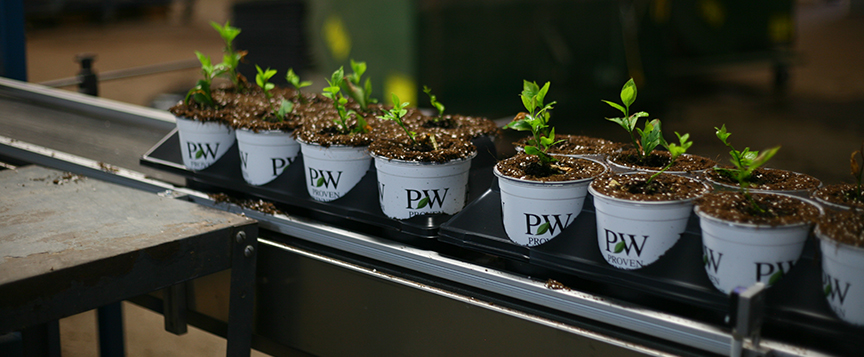Liner Production Innovation
Since our earliest days, innovation has been a key part of our success. We invest in equipment, facilities, plants, and people so that we can provide you a better potted liner. Our basic facilities include:
- Heated floors, high pressure fog, and shade and heat retention curtains in our five acres of prop houses encourage rapid rooting, speeding up production and minimizing backorders.
- Twenty-eight acres of Westbrook Skyline greenhouses are equipped with custom transport rails for which we have developed several pieces of equipment to trim, spray, weed, and grade more efficiently and with greater comfort for our employees.
We welcome you to visit us and see our facilities for yourself - please call your account manager to set up a tour. Until then, here's a look at some of the equipment that helps us grow the strongest, most consistent liners.
TTA Plugsorter Liner Grading Machine
- Sorts liners into four grades, which are determined by leaf surface area and liner height.
- Two digital cameras evaluate each individual shrub liner with a top view and side view photo
- Maximum rate of about 8,000 liners per hour.
- Machine records settings and grading data for each liner crop, which can be used to determine rooting success and crop losses.
See it in action:
TTA Liner Transplanter
- At top rate and with a crew of five to operate it, the machine can process 360 flats per hour/72 flats per man hour.
- Manual transplanting top rate is 52 flats per man hour (260 flats per hours with a five person crew).
See it in action:
Automatic Liner Trimming Boom
- A propriatary piece of equipment, developed and refined by Spring Meadow staff.
- The machine is 24' across and incorporates a ready-made 22' long cutting blade.
- Boom style set-up travels on Westbrook Greenhouse rail system; height is adjustable for various liner crops.
- Roller brushes move cut portions to a conveyer belt, which pushes waste to walkways for easy clean-up.
- Can trim more than 10,000 flats per man hour.
See it in action:
ISO Sticking Machines
- Sticks cuttings into 18, 32, or 72 cell liner trays, with options for single and double sticking.
- On average, each machine can stick 2200 cuttings per hour.
- Cuttings are loaded onto a vibrating belt in each machine, which separates them to enable identification by the robotic arm to pick up and stick.
- Two cameras photograph each cutting to communicate to the arm which cutting to pick up and stick.
- Setup for a new variety takes approximately 30 minutes and needs to be done only once. However, varieties don't always require their own file; the same genus and even similar plants can be grouped together in the same computer file.
- Four machines ganged together with a conveyor belt, a hopper of media to fill flats, and a watering tunnel at the end.
- Requires a crew of four or five people to operate.
Get a 360° view of it in action:
AgriNomix Automated Media Mixer
- Maximum output of 36 cubic yards per hour.
- Up to six components can be mixed.
- Supplies media to four different propagation lines.
- Programmable recipes are stored in control software.
- Unlimited recipes can be assigned to each line at the same time without stopping mixer.
- Lines automatically call for media when hoppers are low.
- Automatically tracks media component usage.
See it in action:
Flood Floors
- Water is pumped into individual houses through an underground piping system.
- Ensures consistent watering throughout the house.
- Foliage remains dry while roots are encouraged to grow deeper, stronger, and healthier.
- It takes six minutes to fill a zone with 6,000 gallons of water and nine minutes to drain back out.
- Remaining water is sent through a filtration system and either sent to a new house or saved in a holding container for the next watering.
See it in action:
Lean Liner Production
Lean production principles are a central part of how we operate at Spring Meadow. Rooted in Japanese automotive manufacturing, lean production holds that work should be conducted with maximum efficiency and minimal waste of effort and products. We implement lean principles primarily in our propagation and shipping departments, where the goal is to keep the flow of production moving at a consistent rate. By looking at our methods critically, making changes that may seem minor can add up to major savings in time and materials over the course of a season.


